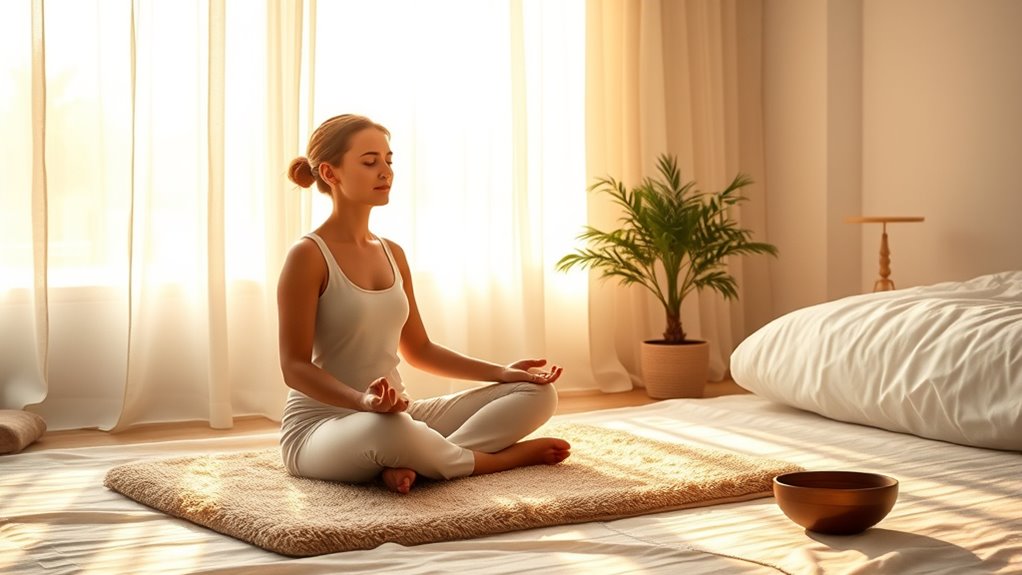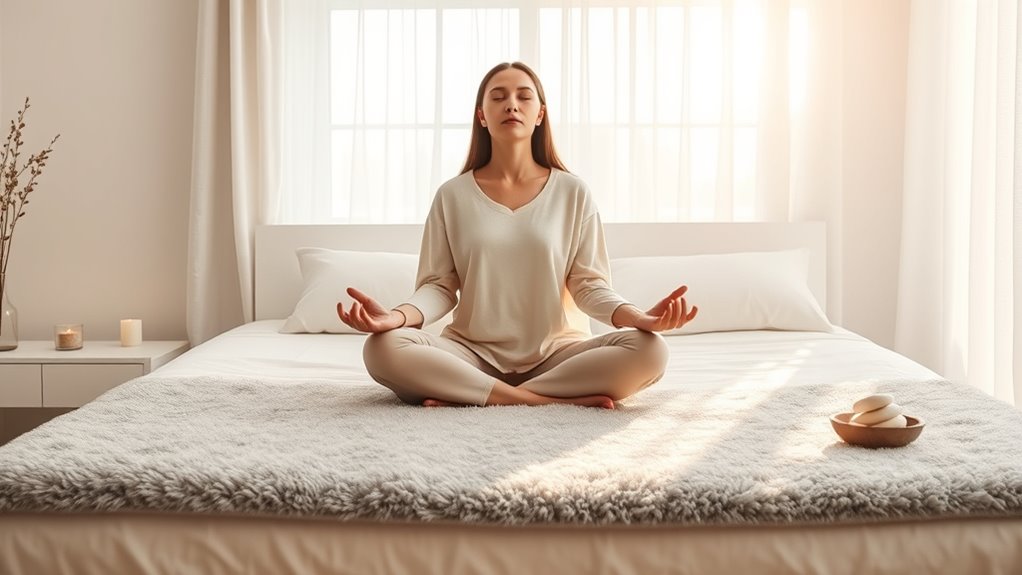Practicing mindfulness meditation can help you relax your mind and body, making it easier to fall asleep and enjoy restful nights. Techniques like mindful breathing and body scans focus your attention on the present, reducing stress and calming racing thoughts. Incorporating a routine of about ten minutes each night builds a strong association with relaxation, gradually enhancing sleep quality. Stay with us to discover how to effectively integrate these practices into your nightly routine for better sleep.
Key Takeaways
- Engage in 10-minute nightly mindfulness exercises, such as breathing and body scan, to promote relaxation and prepare for sleep.
- Focus on breathing sensations to calm the mind and reduce racing thoughts before bedtime.
- Use body scans to release physical tension and enhance physical relaxation conducive to sleep.
- Consistent practice trains the mind to associate mindfulness techniques with sleep readiness.
- Cultivating acceptance and reducing worries through mindfulness fosters emotional calmness essential for restful sleep.

Practicing mindfulness meditation can substantially improve your mental clarity and emotional well-being. When you incorporate mindful breathing into your routine, you create a calming anchor that helps quiet a busy mind. To begin, find a comfortable seated position and focus your attention on your breath. Notice the sensation of air entering and leaving your body, the rise and fall of your chest, or the expansion and contraction of your belly. As you pay close attention to your breathing, you’ll discover a natural rhythm that helps slow racing thoughts and reduce stress, making it easier to relax and shift into sleep.
Mindful breathing calms the mind and reduces stress, easing the way into restful sleep.
A body scan is another powerful technique that enhances your mindfulness practice and promotes better sleep. When you perform a body scan, you systematically bring awareness to each part of your body, starting from your toes and moving upward. As you focus on each area, observe any tension or discomfort without judgment, and imagine releasing it with each exhale. This practice helps you become more attuned to physical sensations and encourages relaxation throughout your entire body. The body scan can be especially effective before bedtime, as it directs your focus away from worries and mental chatter, easing you into a peaceful state suitable for sleep.
Incorporating mindful breathing and body scan exercises into your nightly routine can create a powerful transition from the busyness of the day to restful sleep. You might set aside ten minutes before bed to sit quietly, breathe intentionally, and perform a body scan. Over time, these practices become second nature, training your mind to associate them with relaxation and sleep readiness. Regular practice helps your nervous system shift toward a parasympathetic state—your rest-and-digest mode—which is essential for falling asleep and achieving restorative sleep cycles.
Additionally, mindfulness meditation cultivates a gentle acceptance of your present experience, reducing the tendency to ruminate over past events or worry about the future. This mental shift diminishes anxiety and creates a sense of calm that’s conducive to sleep. Developing a consistent mindfulness routine can also enhance your overall emotional stability, making it easier to maintain a peaceful mindset even during stressful times. As you develop consistency, you’ll find that these techniques not only help you fall asleep faster but also improve sleep quality, leaving you feeling more refreshed in the morning. The simple acts of mindful breathing and body scanning become invaluable tools in your quest for better sleep, helping you wake up feeling more energized and centered each day.
Frequently Asked Questions
Can Mindfulness Meditation Replace Medication for Sleep Issues?
You might wonder if meditation effectiveness can replace sleep medication for sleep issues. While mindfulness meditation can markedly improve your sleep quality by reducing stress and calming your mind, it may not fully replace sleep medication for everyone. Sleep medication provides quick relief, but meditation offers long-term benefits. Ideally, you should discuss your options with a healthcare provider to find the best approach for your specific needs.
How Long Before I See Improvements in Sleep Quality?
You might notice improvements in your sleep patterns within a few weeks of consistent meditation. While some people see changes in as little as a week, others may take longer, depending on your meditation duration and daily commitment. Keep practicing regularly, ideally 10-20 minutes daily. Over time, meditation helps reduce stress and promotes relaxation, leading to better sleep quality and more restful nights.
Is Mindfulness Meditation Suitable for Children or Teenagers?
Ever wonder if kids and teens can benefit from mindfulness meditation? You’re right to ask. While traditional practices might seem adult-oriented, there are child-friendly practices and teen-focused techniques that suit their needs. These methods help improve focus, reduce stress, and promote better sleep. You can introduce simple breathing exercises or guided imagery, making meditation engaging and accessible for young minds. It’s a safe, effective way to support their well-being.
Are There Specific Times of Day Best for Practicing Meditation?
When considering the timing considerations for meditation, you should think about how it fits into your daily routines. The best times often include early mornings to start fresh, or evenings to unwind. You might also find midday sessions helpful to break up your day. Practicing consistently at these times helps establish a habit, making meditation more effective and easier to incorporate into your daily life.
What Should I Do if I Can’t Quiet My Mind During Meditation?
If you can’t quiet your mind during meditation, don’t worry. When mental distraction occurs, gently acknowledge it without judgment. Focus on your breathing exercises, taking slow, deep breaths to anchor your attention. This practice helps you return to the present moment. Remember, it’s normal for your mind to wander; with patience and consistent effort, you’ll find it easier to calm your thoughts over time.
Conclusion
Practicing mindfulness meditation can considerably improve your sleep quality, helping you wake up feeling refreshed. Studies show that nearly 65% of participants experience better sleep after just a few weeks of regular practice. By dedicating a few minutes each day to mindfulness, you’re not only calming your mind but also boosting your overall well-being. So, why not start today? Embrace mindfulness and enjoy more restful, restorative nights ahead.









